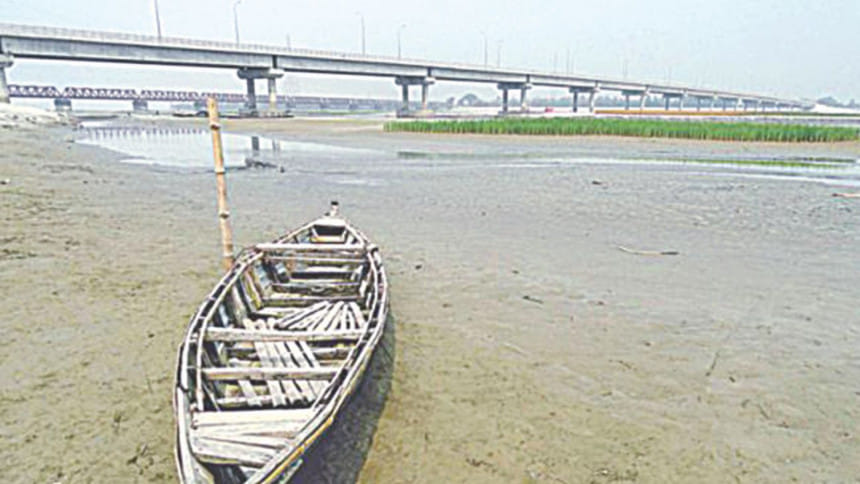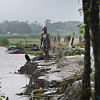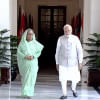The cost of a delayed Teesta treaty

Bangladesh shares 54 of its 57 transboundary rivers with India. Bangladesh experiences severe water crisis in the dry and lean season in most of the shared river basins due to upstream intervention by India, which impedes the livelihood options of the river dependent communities of the country. Over the last four decades, the political, economic, trade and cultural relations of the two close neighbours have endured. But the deadlock in transboundary water sharing is considered as an impediment to the bilateral relation between these two nations. Among the shared rivers of India and Bangladesh, a water sharing treaty exists only for the Ganges, which itself took two decades of negotiation. Water sharing of the rest of the major rivers, especially Teesta, is uncertain. The news of the upcoming visit of Prime Minister Sheikh Hasina to India raised our hopes for the awaited Teesta agreement. But recent statements from different government officials highlight the uncertainty over the Teesta deal, making people disheartened. If the Teesta deal is delayed, Bangladesh must suffer from the prolonged cost of water scarcity due to unilateral withdrawal in upstream India.
In Bangladesh, Teesta is a major supplier of water resources in Rangpur, Lalmonirhat, Rajshahi, Nilphamari, Dinajpur, and Kurigram districts of the North-western region. It is also considered as a prominent tributary and water supplier of the Bhramaputra-Jamuna river system. Twenty-one million people of 5,427 villages and 12 upazilas are completely dependent on the Teesta for their livelihood and economic activities. The estimated catchment area of Teesta is 12,159 Sq. Km, out of which 10,155 lies in India. When India constructed the Gazaldoba barrage in the upper Teesta region and started large scale irrigation projects in 1989, the water flow in Bangladesh was severely reduced. The water stress turns acute in Bangladesh when India starts storing and utilising Teesta's water in Sikkim for hydroelectricity generation. It also threatens the ecological sustainability of the river which causes irreversible damage in both the upper and lower basin.
India has already brought about 58 percent of its total irrigable areas in the Teesta basin under irrigation. Whereas, due to enormous water scarcity, on Bangladesh's side this figure stands at 20 percent of its total irrigable area, which turns worse during the dry season as a large share of water is diverted and utilised by India through the Gazaldoba barrage.
In 1997 water flow of Teesta was nearly 6,500 cusec in the Bangladesh part. This was reduced to 1,348 cusec in 2006, and further deteriorated to 300 cusec in 2016 during the dry period. Since, Teesta is a transboundary river, Bangladesh is supposed to get an equitable share of water.
The 1,11,406 hectors of irrigable land in the Teesta basin area inside Bangladesh can be irrigated in the Aus and Aman season but during the Boro season, a large amount of land is kept uncultivated due to water scarcity. In the 2006-07 and 2013-14 cropping years, only 11,323 and 27,486 hectors of land could be cultivated respectively, which is only 14 percent and 35 percent of the total irrigable area.
From 2006 to 2014, we lost a total of 42,54,218 metric tonnes of Boro production from that area. At the current market price, the cost of this forgone production is BDT 81,326 million. During the last ten years, Teesta was entirely dried up five times, which has had enormous ecological costs.
The government of Bangladesh must assess the overall socio-economic and environmental loss and damages due to water scarcity in the Teesta basin and bring it to the negotiation table. Despite repeated assurances from India that they will not take any action that is harmful for its neighbour, effective initiatives to solve the Teesta water sharing issues are yet be seen.
Water is a very crucial issue for Bangladesh. Increasing the waiting time for the Teesta deal not only harms Bangladesh, but also adds up the cost of water scarcity everyday, which may affect the bilateral relationship. Dhaka has already proved to be a friend by providing transit and helping India crack down on militant groups. It is now their turn. Although delayed, if New Delhi comes up with optimum solutions and restores the confidence of Dhaka regarding transboundary water issues during the upcoming visit of our Prime Minister, it will definitely strengthen the bilateral relationship between these close neighbours.
The writer is an environmental economist and senior research analyst at the International Business Forum of Bangladesh.

 For all latest news, follow The Daily Star's Google News channel.
For all latest news, follow The Daily Star's Google News channel. 








Comments